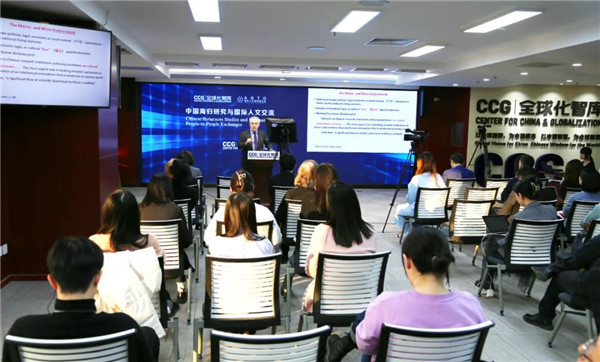CCG holds a seminar on Chinese Returnees Studies and International People-to-People Exchanges
[Speeches Part]
[Seminar Part]
On December 28th, the Center for China and Globalization (CCG) and the Alliance of Global Talent Organizations (AGTO) jointly organized a seminar titled Chinese Returnees Studies and International People-to-People Exchanges. Prof. Wang Huiyao, President of CCG and Secretary-General of AGTO, Prof. David Zweig, Vice Director of CCG and Director of AGTO Research Department, and Prof. Miao Lu, Secretary-General of CCG and Deputy Secretary-General of AGTO discussed topics such as the latest research on Chinese returnees, the current state and trends of Chinese returnees, and Sino-US talent exchange and cooperation during the seminar.
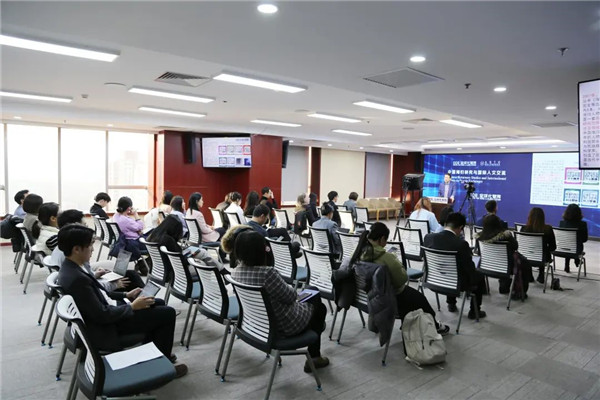
Over the past decade, there has been continued improvement in the development of Chinese students that have studied abroad and returned to China. In 2021, the number of Chinese returnees living and working in China exceeded one million for the first time, playing important roles in the fields such as education, science, culture, health, and social governance.
As one of the few institutions in China that has systematically conducting research on returnees, the Center for China and Globalization has played a crucial role in promoting the development of Chinese returnees. Over the past 20 years, CCG has published over 60 blue books and books related to returnees in both Chinese and English, published articles on Chinese students studying abroad and returning in nearly a hundred academic journals, organized nearly 30 forums and seminars on innovation and entrepreneurship for overseas students, and received endorsements from government leaders for nearly 20 policy proposals related to studying abroad and returnee development.
For more than two decades, CCG has continually expanded the scope of its research on returnee issues, beginning with research into returnee issues and expanding into developments in studying abroad, international schools, and international education. It has also examined competitive strategies for supporting returnees and evaluating the current talent pool. CCG’s research has extended even further into studies on overseas Chinese professionals, international talent mobility, and international migration, creating a new narrative surrounding returnee issues. This has resonated well with central government departments, returnees, and wider society, while also making globalization think tanks key players in returnee research.
In November 2023,President Xi Jinping made the announcement at a welcome dinner by friendly organizations in the United States and said that China is ready to invite 50,000 young Americans to China on exchange and study programs in the next five years to increase exchanges between the two peoples, especially between the youth.There is already a significant number of Chinese students abroad and returning home, which has created a significant impact on global development. Given the current complex and challenging international environment, Chinese students studying abroad will play an even more crucial role in people-to-people diplomacy and cultural exchanges between China and other countries.
This seminar on Chinese Returnees Studies and International People-to-People Exchanges comes at a key juncture in the exploration of research into the development of Chinese returnees, providing an opportunity to understand, better enable, and empower the Chinese returnee community, while also promoting China’s global development and facilitating cultural exchange.
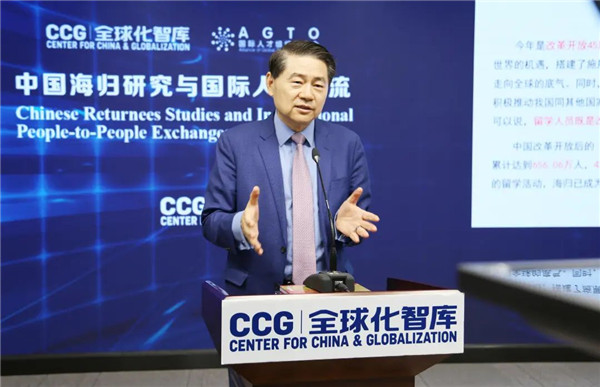
Wang Huiyao delivered a keynote speech during the seminar titled “Twenty Years of Chinese Returnees Research”, noting that this year marks the 45th anniversary of China’s reform and opening up, which has provided abundant opportunities for a vast number of overseas students to study abroad and broaden their perspectives. Simultaneously, these overseas students have actively engaged in the process of reform and opening up, as well as socialist modernization as well as the promotion of exchange and cooperation between China and other countries that have also made significant contributions to China’s economic and social development. Chinese students that have studied abroad have both benefited from and contributed to reform and opening up .
During the speech, Wang Huiyao noted the achievements CCG has made in research into Chinese overseas education and returnee topics over the past two decades, highlighting the contributions it has made in publishing returnee research and theoretical innovation. CCG’s work in returnee research has also extended beyond publications to include initiatives such as establishing platforms for returnees, organizing forums and seminars, and even influencing national policies related to returning students and studying abroad, which have yielded remarkable results.
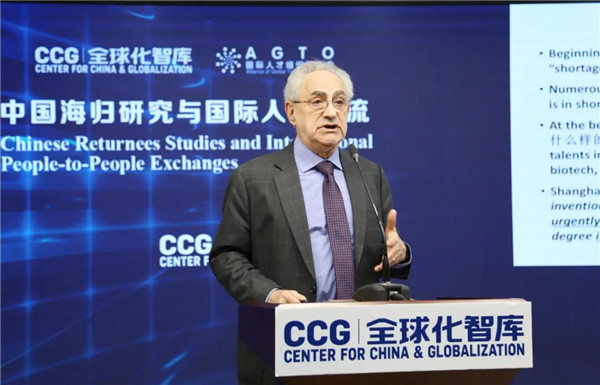
Prof. David Zweig followed Prof. Wang highlighting a series of achievements in the field of Chinese returnee research. He shared his close connection with China, focusing on two perspectives – environment and rewards – to elaborate on his observations and reflections on the issue of Chinese returnees. Prof. David Zweig discussed the opportunities and challenges of Chinese students returning home from a variety of angles, including market demand, employment environment, and academic influence.
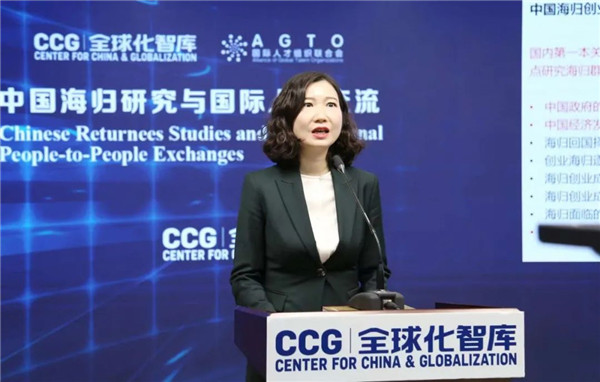
Secretary-General Miao Lu also delivered a speech titled “Current Status and Trends of Chinese Returnee Development”, which provided detailed insights into the current state and patterns of Chinese students returning home from abroad. She also summarized the overall development trends of Chinese returnees, emphasizing their crucial role in national development.
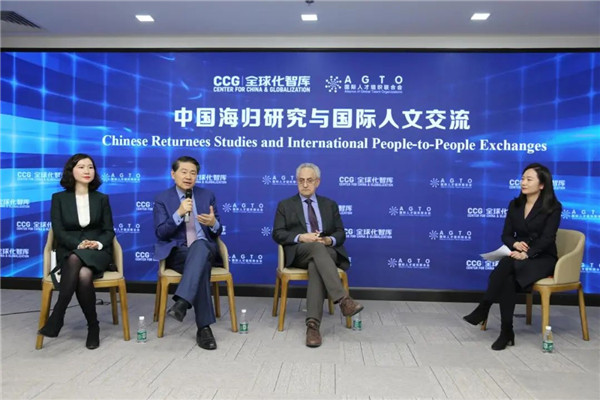
Luo Yan, Director of CCG’s Media and Public Relations Department, moderated a subsequent discussion in which the three guests discussed issues related to studying abroad, Chinese returnee research, Sino-US cultural exchanges, and international talent mobility.
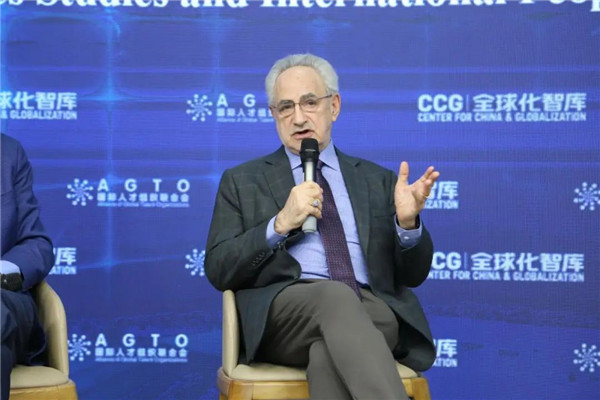
Prof. David Zweig emphasized that talent exchange and cooperation between China and the United States remain crucial aspects of their bilateral relationship, and maintaining the flow of scientific and technological talent between the two countries is an undeniable win-win. The recent meeting between the leaders of China and the United States demonstrate China’s commitment to further opening up and will have a broad impact on China’s interactions with other countries worldwide while also boosting confidence in China’s domestic openness. He noted that CCG should leverage its existing advantages in providing a dialogue platform for people-to-people exchanges in a post-pandemic world, with particular emphasis on the role of Track II diplomacy.
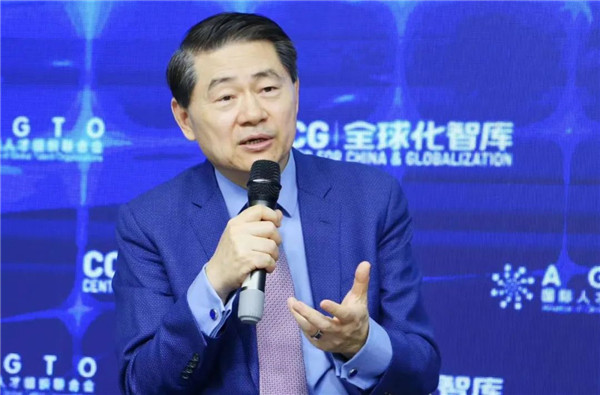
Prof. Wang Huiyao pointed out the significant decision made by President Xi Jinping during a welcome banquet where he announced that over the next five years, China is willing to support 50,000 American young people to come to China for exchange and learning. This decision demonstrates China’s vision for the future. With over 3,000 universities, many of which are top-ranked globally, China has the potential to set up programs to attract American students, including summer programs and other short-term or even long-term initiatives. Prof. Wang also emphasized the importance of international talent mobility as a significant component of research on globalization, which makes exploring “returnee studies” imperative, hoping that returnee research can provide new perspectives for human civilization. Additionally, in a post-pandemic world that lacks a global mechanism for a multipolar world, Prof. Wang stressed that strengthening people-to-people exchanges is a positive step in addressing current global challenges.
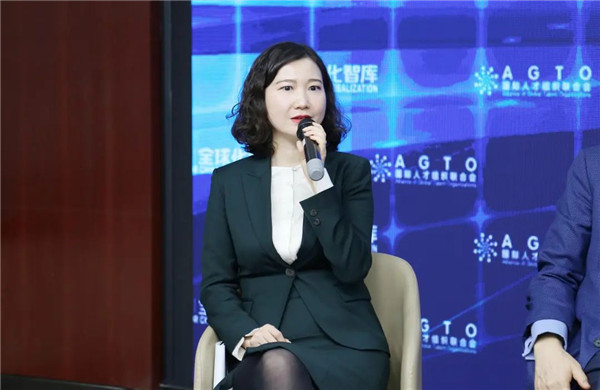
Secretary-General Miao Lu commented on Sino-US cultural exchanges, noting that the recent meeting between the Chinese and US leaders has injected a new vitality into talent exchanges between the two countries. China’s willingness to invite 50,000 American young people to China for exchange and learning over the next five years is crucial and will send a signal to the world about the importance of enhancing cooperation between the two nations. The Global Young Leaders Dialogue (GYLD) project, initiated by CCG, aims to do just this, providing a platform for young people worldwide to exchange ideas, contributing in particular to the strengthening of cultural exchanges between China and the United States. It is believed that Sino-US talent exchanges, especially among students and scholars, will become a bridge for promoting mutual benefit and win-win cooperation between the two countries, while also serving as a window to showcase China to the world.
